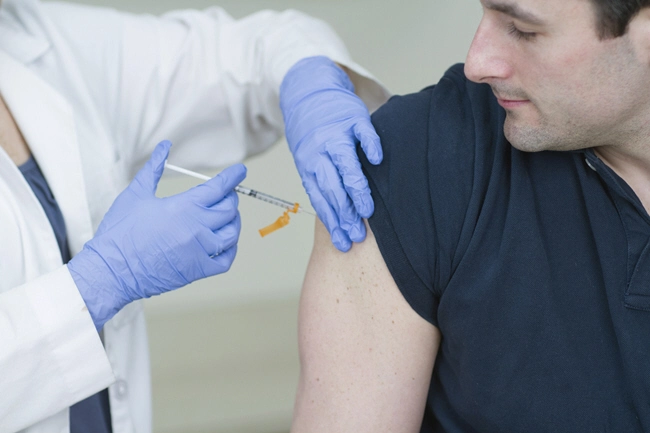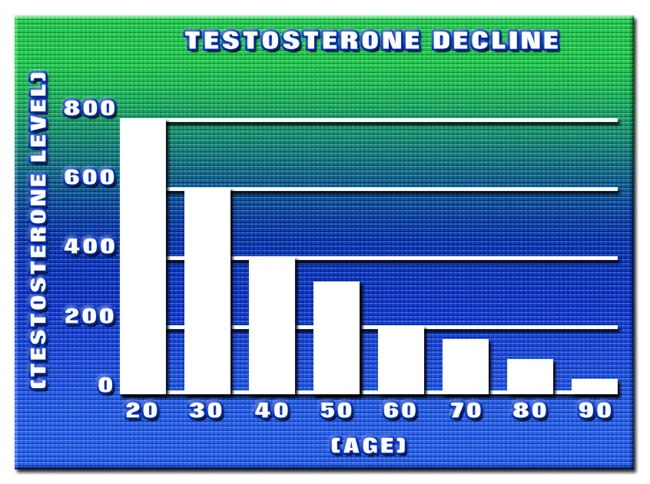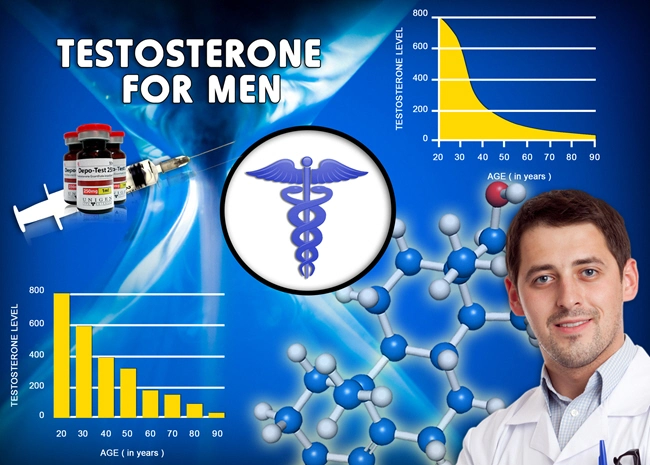
Introduction
Testosterone enanthate, a commonly prescribed form of testosterone replacement therapy (TRT), has been a subject of interest and concern among American men, particularly in relation to its impact on prostate health. As men age, the natural decline in testosterone levels can lead to a variety of symptoms, prompting many to seek TRT. However, the potential risks associated with such treatments, including their effects on the prostate, necessitate a thorough understanding. This article delves into the correlation between testosterone enanthate use and prostate health, providing American men with essential insights to make informed health decisions.
Understanding Testosterone Enanthate
Testosterone enanthate is an injectable form of testosterone used to treat conditions associated with low testosterone levels, such as hypogonadism. It works by supplementing the body's natural testosterone, thereby alleviating symptoms like reduced libido, fatigue, and muscle loss. While effective, its use has raised questions about long-term safety, particularly concerning prostate health.
Prostate Health and Testosterone Levels
The prostate gland, a crucial part of the male reproductive system, can be influenced by hormonal changes. Elevated testosterone levels, whether natural or induced by TRT, have been hypothesized to potentially increase the risk of prostate-related issues, including benign prostatic hyperplasia (BPH) and prostate cancer. However, the relationship between testosterone enanthate and prostate health is not straightforward and requires careful examination.
Research Findings on Testosterone Enanthate and Prostate Health
Numerous studies have explored the connection between testosterone enanthate and prostate health. A significant body of research suggests that TRT, including testosterone enanthate, does not increase the risk of prostate cancer in men with normal prostate-specific antigen (PSA) levels prior to treatment. In fact, some studies indicate that TRT may even have a protective effect against aggressive forms of prostate cancer.
However, other research has found a potential link between TRT and an increased risk of BPH. BPH is a non-cancerous enlargement of the prostate that can lead to urinary symptoms. Men on testosterone enanthate should be monitored for signs of BPH, as early detection and management can prevent complications.
Clinical Guidelines and Monitoring
Given the mixed findings, clinical guidelines recommend cautious use of testosterone enanthate, particularly in men with a history of prostate issues. Regular monitoring of PSA levels and digital rectal exams (DRE) are essential for men on TRT to ensure any changes in prostate health are detected early. It is crucial for American men to discuss the benefits and risks of testosterone enanthate with their healthcare providers to tailor treatment to their specific health needs.
Personalized Approach to TRT
Every man's health profile is unique, and the decision to use testosterone enanthate should be based on a comprehensive evaluation of his medical history, current health status, and personal goals. Men considering or currently using TRT should engage in open dialogue with their doctors about any concerns regarding prostate health. Personalized treatment plans that consider all aspects of a patient's health can help maximize the benefits of testosterone enanthate while minimizing potential risks.
Conclusion
The relationship between testosterone enanthate and prostate health in American men is complex and multifaceted. While TRT can significantly improve quality of life for men with low testosterone, it is essential to weigh the potential risks, particularly concerning prostate health. By staying informed and working closely with healthcare professionals, American men can navigate the use of testosterone enanthate safely and effectively, ensuring their overall health and well-being.
Contact Us Today For A Free Consultation
Dear Patient,
Once you have completing the above contact form, for security purposes and confirmation, please confirm your information by calling us.
Please call now: 1-800-380-5339.
Welcoming You To Our Clinic, Professor Tom Henderson.

- Testosterone Enanthate: Benefits, Risks, and Ethics in American Male Athletes' Performance [Last Updated On: February 19th, 2025] [Originally Added On: February 18th, 2025]
- Testosterone Enanthate: Enhancing Muscle, Reducing Fat for Weight Management in American Men [Last Updated On: March 17th, 2025] [Originally Added On: March 17th, 2025]
- Personalizing Testosterone Enanthate Therapy for Optimal Health Outcomes in American Men [Last Updated On: March 17th, 2025] [Originally Added On: March 17th, 2025]
- Testosterone Enanthate: A Solution for Sexual Dysfunction in American Males [Last Updated On: March 18th, 2025] [Originally Added On: March 18th, 2025]
- Testosterone Enanthate: Cycle, Benefits, Risks, and Legal Issues for American Athletes [Last Updated On: March 18th, 2025] [Originally Added On: March 18th, 2025]
- Testosterone Enanthate: A Promising Treatment for Depression in American Men [Last Updated On: March 18th, 2025] [Originally Added On: March 18th, 2025]
- Testosterone Enanthate: Enhancing Cognitive Function in American Men [Last Updated On: March 19th, 2025] [Originally Added On: March 19th, 2025]
- Testosterone Enanthate: Impacts on Prostate Health in American Males [Last Updated On: March 19th, 2025] [Originally Added On: March 19th, 2025]
- Testosterone Enanthate: Benefits, Risks, and Management for American Men [Last Updated On: March 19th, 2025] [Originally Added On: March 19th, 2025]
- Testosterone Enanthate's Impact on Sleep Quality in American Men: Benefits and Risks [Last Updated On: March 20th, 2025] [Originally Added On: March 20th, 2025]
- Long-term Testosterone Enanthate Use: Health Risks for American Men [Last Updated On: March 20th, 2025] [Originally Added On: March 20th, 2025]
- Testosterone Enanthate: A Promising Treatment for Osteoporosis in American Men [Last Updated On: March 21st, 2025] [Originally Added On: March 21st, 2025]
- Testosterone Enanthate: Medical Uses, Myths, and Performance Risks in American Males [Last Updated On: March 22nd, 2025] [Originally Added On: March 22nd, 2025]
- Testosterone Enanthate's Impact on Male Fertility: Insights for American Men on TRT [Last Updated On: March 22nd, 2025] [Originally Added On: March 22nd, 2025]
- Testosterone Enanthate: A Promising Therapy for Chronic Pain in American Males [Last Updated On: March 23rd, 2025] [Originally Added On: March 23rd, 2025]
- Testosterone Enanthate: Medical Uses, Cultural Perceptions, and Ethical Concerns in the U.S. [Last Updated On: March 23rd, 2025] [Originally Added On: March 23rd, 2025]
- Testosterone Enanthate: A Potential Aid in Stress Management for American Men [Last Updated On: March 23rd, 2025] [Originally Added On: March 23rd, 2025]
- Testosterone Enanthate: Enhancing Injury Recovery in American Males - Benefits and Risks [Last Updated On: March 23rd, 2025] [Originally Added On: March 23rd, 2025]
- Testosterone Enanthate: Enhancing Immune Function in American Men [Last Updated On: March 23rd, 2025] [Originally Added On: March 23rd, 2025]
- Testosterone Enanthate: Impacts on Hair Growth and Loss in American Men [Last Updated On: March 24th, 2025] [Originally Added On: March 24th, 2025]
- Testosterone Enanthate: Enhancing Vitality in Aging American Men [Last Updated On: March 24th, 2025] [Originally Added On: March 24th, 2025]
- Ethical Dilemmas of Testosterone Enanthate Use in American Males: Medical vs. Enhancement [Last Updated On: March 24th, 2025] [Originally Added On: March 24th, 2025]
- Optimizing Testosterone Enanthate Therapy: Dosage, Monitoring, and Lifestyle Integration [Last Updated On: March 24th, 2025] [Originally Added On: March 24th, 2025]
- Testosterone Enanthate's Impact on Appetite and Digestion in American Men [Last Updated On: March 24th, 2025] [Originally Added On: March 24th, 2025]
- Testosterone Enanthate: Enhancing Body Composition in American Males - Benefits and Risks [Last Updated On: March 24th, 2025] [Originally Added On: March 24th, 2025]
- Testosterone Enanthate's Impact on Vision and Eye Health in American Males: A Review [Last Updated On: March 24th, 2025] [Originally Added On: March 24th, 2025]
- Testosterone Enanthate's Impact on Blood Sugar Levels in American Men: A Comprehensive Analysis [Last Updated On: March 24th, 2025] [Originally Added On: March 24th, 2025]
- Testosterone Enanthate's Impact on Mental Clarity in American Males: Benefits and Risks [Last Updated On: March 24th, 2025] [Originally Added On: March 24th, 2025]
- Testosterone Enanthate: Enhancing Endurance in American Male Athletes - Benefits and Risks [Last Updated On: March 25th, 2025] [Originally Added On: March 25th, 2025]
- Testosterone Enanthate: Benefits, Limitations, and Management for American Men [Last Updated On: March 25th, 2025] [Originally Added On: March 25th, 2025]
- Testosterone Enanthate Withdrawal: Symptoms, Management, and Long-Term Considerations [Last Updated On: March 25th, 2025] [Originally Added On: March 25th, 2025]
- Testosterone Enanthate: A Promising Therapy for Obesity in American Males [Last Updated On: March 25th, 2025] [Originally Added On: March 25th, 2025]
- Testosterone Enanthate: A Dual Approach to Treating Anemia in Hypogonadal Men [Last Updated On: March 25th, 2025] [Originally Added On: March 25th, 2025]
- Testosterone Enanthate Therapy: Benefits and Risks for Men Over 50 [Last Updated On: March 25th, 2025] [Originally Added On: March 25th, 2025]
- Testosterone Enanthate Boosts Skin Elasticity in American Males: Benefits and Risks [Last Updated On: March 25th, 2025] [Originally Added On: March 25th, 2025]
- Testosterone Enanthate: Enhancing Mood in American Males with Low Testosterone [Last Updated On: March 26th, 2025] [Originally Added On: March 26th, 2025]
- Testosterone Enanthate's Impact on Joint Health in American Men: Benefits and Risks [Last Updated On: March 26th, 2025] [Originally Added On: March 26th, 2025]
- Testosterone Enanthate: Benefits, Risks, and Cost-Benefit Analysis for American Males [Last Updated On: March 27th, 2025] [Originally Added On: March 27th, 2025]
- Testosterone Enanthate: A Vital Therapy for Muscle Wasting in American Men [Last Updated On: March 27th, 2025] [Originally Added On: March 27th, 2025]
- Testosterone Enanthate's Impact on Liver Health in American Men: Monitoring and Management [Last Updated On: March 27th, 2025] [Originally Added On: March 27th, 2025]
- Testosterone Enanthate: A Potential Treatment for Chronic Fatigue Syndrome in American Males [Last Updated On: March 27th, 2025] [Originally Added On: March 27th, 2025]
- Testosterone Enanthate's Role in Managing Diabetes Among American Males [Last Updated On: March 28th, 2025] [Originally Added On: March 28th, 2025]
- Testosterone Enanthate Therapy: Enhancing American Veterans' Health and Well-being [Last Updated On: March 28th, 2025] [Originally Added On: March 28th, 2025]
- Testosterone Enanthate's Impact on Cardiovascular Endurance in American Men: Risks and Benefits [Last Updated On: March 28th, 2025] [Originally Added On: March 28th, 2025]
- Testosterone Enanthate: A Novel Approach to Managing Allergies in American Males [Last Updated On: March 28th, 2025] [Originally Added On: March 28th, 2025]
- Testosterone Enanthate: Enhancing Post-Surgical Recovery in American Men [Last Updated On: March 28th, 2025] [Originally Added On: March 28th, 2025]
- Testosterone Enanthate's Impact on Dental Health in American Males: A Comprehensive Review [Last Updated On: March 28th, 2025] [Originally Added On: March 28th, 2025]
- Testosterone Enanthate Therapy: Impacts on Life Expectancy and Quality of Life in Men [Last Updated On: March 28th, 2025] [Originally Added On: March 28th, 2025]
- Testosterone Enanthate: A Promising Treatment for Autoimmune Disorders in American Males [Last Updated On: March 29th, 2025] [Originally Added On: March 29th, 2025]
- Testosterone Enanthate's Impact on Hearing Health in American Men: A Review [Last Updated On: March 29th, 2025] [Originally Added On: March 29th, 2025]
- Testosterone Enanthate: Enhancing Respiratory Function in American Men [Last Updated On: March 30th, 2025] [Originally Added On: March 30th, 2025]
- Testosterone Enanthate Therapy: Impacts on Kidney Function in American Males [Last Updated On: March 30th, 2025] [Originally Added On: March 30th, 2025]
- Testosterone Enanthate: Emerging Treatment for Gastrointestinal Disorders in American Males [Last Updated On: March 31st, 2025] [Originally Added On: March 31st, 2025]
- Testosterone Enanthate: Enhancing Neurological Health in American Men [Last Updated On: April 3rd, 2025] [Originally Added On: April 3rd, 2025]
- Testosterone Enanthate: A New Approach to Managing Hypertension in American Males [Last Updated On: April 3rd, 2025] [Originally Added On: April 3rd, 2025]
- Testosterone Enanthate: Benefits, Fertility Risks, and Hormonal Impact in American Males [Last Updated On: April 4th, 2025] [Originally Added On: April 4th, 2025]
- Testosterone Enanthate's Role in Managing Respiratory Disorders in American Males [Last Updated On: April 6th, 2025] [Originally Added On: April 6th, 2025]
- Testosterone Enanthate's Impact on Adrenal Health in American Males: A Comprehensive Analysis [Last Updated On: April 7th, 2025] [Originally Added On: April 7th, 2025]
- Testosterone Enanthate's Impact on Immune Function in American Males: A Comprehensive Review [Last Updated On: April 8th, 2025] [Originally Added On: April 8th, 2025]
- Testosterone Enanthate Therapy: Benefits, Risks, and Endocrine System Management [Last Updated On: April 9th, 2025] [Originally Added On: April 9th, 2025]
- Testosterone Enanthate Therapy's Impact on Thyroid Function in American Men [Last Updated On: April 9th, 2025] [Originally Added On: April 9th, 2025]
- Testosterone Enanthate: Emerging Dermatological Benefits for American Men [Last Updated On: April 9th, 2025] [Originally Added On: April 9th, 2025]
- Testosterone Enanthate's Impact on Cardiovascular Health in American Males: A Review [Last Updated On: April 10th, 2025] [Originally Added On: April 10th, 2025]
- Testosterone Enanthate: Enhancing Musculoskeletal Health in American Men [Last Updated On: April 10th, 2025] [Originally Added On: April 10th, 2025]
- Testosterone Enanthate's Impact on Gastrointestinal Health in American Males [Last Updated On: April 11th, 2025] [Originally Added On: April 11th, 2025]
- Testosterone Enanthate: Enhancing Hematological Health in American Men [Last Updated On: April 12th, 2025] [Originally Added On: April 12th, 2025]
- Testosterone Enanthate: Managing Metabolic Disorders in American Males [Last Updated On: April 12th, 2025] [Originally Added On: April 12th, 2025]
- Testosterone Enanthate: Exploring Neurological Benefits in American Males [Last Updated On: April 13th, 2025] [Originally Added On: April 13th, 2025]
- Testosterone Enanthate Boosts Immune Function in American Men: Research Insights [Last Updated On: April 16th, 2025] [Originally Added On: April 16th, 2025]
- Testosterone Enanthate: Enhancing Gastrointestinal Health in American Men [Last Updated On: April 16th, 2025] [Originally Added On: April 16th, 2025]
- Testosterone Enanthate: Vital Role in Managing Hypogonadism and Endocrine Disorders [Last Updated On: April 16th, 2025] [Originally Added On: April 16th, 2025]
- Testosterone Enanthate's Metabolic Impact on American Males: Benefits and Risks [Last Updated On: April 17th, 2025] [Originally Added On: April 17th, 2025]
- Testosterone Enanthate Therapy: Benefits, Risks, and Reproductive Health Impact [Last Updated On: April 17th, 2025] [Originally Added On: April 17th, 2025]
- Testosterone Enanthate's Impact on Respiratory Health in American Males: A Review [Last Updated On: April 17th, 2025] [Originally Added On: April 17th, 2025]
- Testosterone Enanthate Therapy: Cardiovascular Benefits and Risks in American Men [Last Updated On: April 17th, 2025] [Originally Added On: April 17th, 2025]
- Testosterone Enanthate's Dermatological Effects on American Males: Acne, Hair Loss, and Skin Health [Last Updated On: April 18th, 2025] [Originally Added On: April 18th, 2025]
- Testosterone Enanthate: A Promising Treatment for Musculoskeletal Disorders in American Males [Last Updated On: April 18th, 2025] [Originally Added On: April 18th, 2025]
- Testosterone Enanthate: A Promising Treatment for Hematological Disorders in American Men [Last Updated On: April 20th, 2025] [Originally Added On: April 20th, 2025]
- Testosterone Enanthate: Treating Hypogonadism and Enhancing Men's Quality of Life [Last Updated On: April 21st, 2025] [Originally Added On: April 21st, 2025]
- Testosterone Enanthate: Benefits, Risks, and Management for American Males [Last Updated On: April 22nd, 2025] [Originally Added On: April 22nd, 2025]








